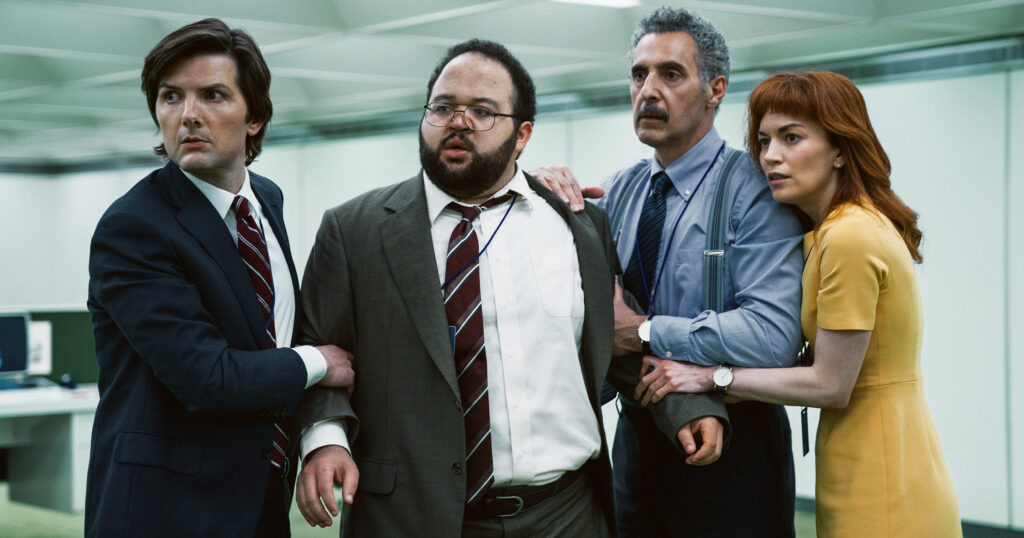The Apple TV + Severance series presents a world in which office workers have their minds divided into two personalities – one who only remembers what happens at work and one who only remembers what happens outside of it. Science fiction author John Kessel loves the inventive premise of the show.
“After watching the first episode, I told my wife, ‘This is one of the smartest shows I’ve seen in a long time,'” Kessel says in episode 509 of The Geek’s Guide to the Galaxy podcast. “I ranked him – at least until this first season – as well as doing things like Breaking Bad. I really think it’s classic. ”
Geek’s Guide to the Galaxy host David Barr Kirtley agrees that Severance is a remarkable series. “This is my favorite show of the last year or two,” he says. “I think you should go back to something like Devs or Dark for something I liked as much as this.”
Writer Sara Lynn Michener enjoys the way Severance gives a unique twist to the idea of using robots or clones for unpleasant tasks. “This is obviously something I’ve seen repeatedly in science fiction over and over again,” she says. “Who are the slaves?” Who is the group of people for single use? And so what this show does is create that concept of literally splitting in two and that part of you is something to put aside. It’s really unsettling. ”
Science fiction author Anthony Ha is looking forward to season 2 of Severance, but worries that the series could extend the story to too many episodes. “I felt that the pace slowed down a bit in the middle of the season, and I wonder if there’s an even better version of it, which is the ‘one season and done,'” he says.
Listen to the full interview with John Kessel, Sara Lynn Michener and Anthony Ha in episode 509 of the Geek’s Guide to the Galaxy (above). And you see some important moments in the discussion below.
John Kessel about Franz Kafka:
We’ve been watching a whole season and we still don’t know what they’re doing at this corporation. They kind of round out “bad” numbers and eliminate them. I keep thinking: Is this a metaphor? Is this something else? The whole idea of the cult and the great founder, all these things are really intriguing to me. It reminds me of Kafka, with the Trial or the Castle. In the Castle, there are these people in the castle who run things and you never enter the castle – you don’t know who they are or what they do up there. I don’t know if Dan Erickson had anything special in mind, but there are a lot of metaphorical things that are very interesting to me.
Sara Lynn Michener on Patricia Arquette:
Patricia Arquette does a fantastic job in this show. She practically plays two different characters, but she is not separated. She intentionally has two different characters and two different names, because she’s high enough in the company to be able to do that. Her service character is this very creepy, rigid and obsessive person, and then, in the character of “neighbor”, she appears like a crazy cat – she dresses completely differently from her other character. So it’s a really great performance by Patricia Arquette, because it captures both sides of this very disturbing, disturbing and crazy person.
Anthony Ha on set design:
The visual style doesn’t refer to the “Googleplex, brightly colored, glass, open plan” style of Silicon Valley, but it’s much more about this older style of work. That’s how I imagine the offices my parents went to. Just the fact that it’s a farm with cabins, as opposed to a bunch of offices. I mean, I think there’s a logic in the world for that, because if everyone had laptops and they sat down and could get on the internet right away, that would somehow defeat the whole purpose of parting, but I think there’s a emotional logic for this. It should feel like a nightmare of office life, as opposed to a realistic representation of how it is now.
David Barr Kirtley on characterization:
There is this constant idea that [the characters] will somehow escape and I don’t see any way that really works. Even if they say that this is the process of exploitation, it seems that if the parting program were closed and the chips were stopped, everyone would actually die. If their agenda is basically “we’d all rather be dead than at work for the rest of our lives,” that makes sense, but I feel like the idea was pushed into the background in the show. Looks like not everyone wants to die. Looks like they have some hope of escape and I’m not sure what they imagine will happen.
More great stories WIRED
